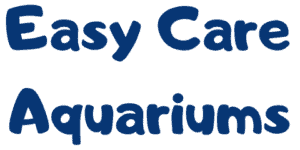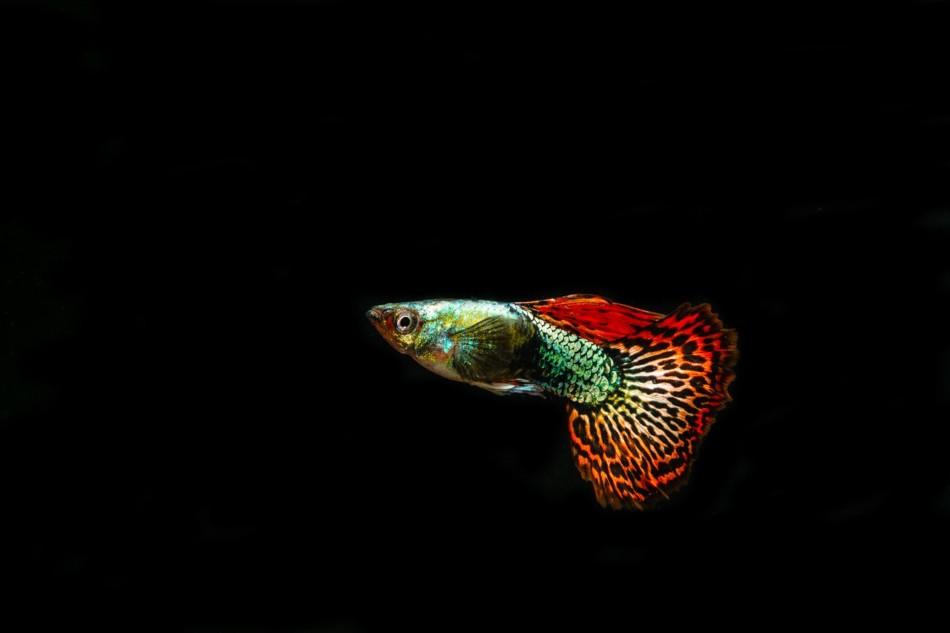This article may contain some affiliate links to products. The links provide me a small percentage of commission but do not cost you anything extra to use. (See full disclosure statement here ).
).
The Guppy is an omnivorous fish and will eat both meaty protein and vegetable matter. Which means that they are happy to eat whatever food is available to them at the time.
Guppies enjoy eating live, dried and frozen meaty protein. So small insects/larvae such as newly hatched brine shrimp, daphnia and micro-worms will be readily accepted. Guppies also eat green vegetables and a little algae alongside protein-rich flake and pellet foods. This versatility makes the Guppy in the home aquarium easy to feed.
Any food that you feed to your Guppies needs to be small or broken down into tiny pieces so that they can manage it. But apart from a little crushing or chopping it’s easy to feed them a varied and healthy diet.
Keep reading for some easy-care feeding tips and useful information.
Tip: Because the Guppy is a small fish with a small mouth all foods need to be tiny. So you may have to do some crushing, chopping and/or mincing to break the food down enough for them to manage. It’s simple to do and isn’t time consuming. And it’s definitely worth the small effort involved.
What Should I Feed To My Guppies?
The Guppy (Poecilia reticulata) is native to south/northeast America but has been found in other areas. In its native habitat it lives in shallow freshwater streams and pools, often ones linked to larger bodies of water. In their native environment Guppies feed off whatever is available. This includes plant and animal matter, insects and insect larvae and vegetation of different kinds.
When kept in an aquarium they are just as easy to feed as they are not fussy when it comes to food. A varied diet rich in protein is important though if you want to keep your Guppies in the best of health.
And because they are not fussy eaters there’s lots to choose from when it comes to mealtimes for your Guppies.
Just like most freshwater aquarium fish, flake foods are a good place to start until you have a little more experience or you’re just ready expand their menu.
Let’s take a look at which foods you can offer to your Guppies at feeding time
Flake/Granular/Micro-Pellet Foods For Guppies
Flake, granular and/or micro-pellet foods are the easiest way to provide the basis of your Guppies’ diet. Good quality foods in these forms contain both protein and vegetable matter and also added nutrients. You do need to choose ones that have a high protein content though. But, overall, these food types will provide a complete and nutrition filled diet for your Guppies. They are also the easiest and least messy way to feed your fish.
If you’re new to the fish keeping hobby these types of foods are a great way to start. And even when you become more experienced in the fish keeping hobby they are likely to still form the basic food source for your fish/shrimp/snails.
Although Guppies prefer to feed nearer the top of the tank they will feed anywhere in the water column if they need to. So another point in favour of flake, granular and micro-pellet foods for Guppies is that they are usually slow sinking which gives your fish a chance to feed at a higher level.
The Easy Way To Feed Insects To Your Guppies
Guppies love their protein foods and they are important when it comes to keeping your Guppies happy and healthy. Which means to keep them well fed in your aquarium you need to make sure they get enough ‘meaty’ foods alongside the vegetables/vegetation.
Fortunately, feeding your fish protein rich foods is easy. Live, freeze-dried, dried and frozen protein foods for your Guppies are available at Pet Stores, Aquatic Dealers and Online.
Here’s Some Of The Protein Foods That You Can Offer To Your Guppies
- Brine Shrimp (newly hatched)
- Daphnia (tiny freshwater crustacean)
- Mosquito Larvae (worm-like baby mosquito)
- Blood Worms (larvae of the midge fly)
- Tubifex Worms (preferably dried ones to reduce risk of infections)
You can also offer Micro Worms and Banana Worms both of which your Guppies are likely to enjoy. It can be a bit trial and error to begin with depending on what your Guppies were used to eating before you bought them. But you’ll soon get to know what their favourites are.
Tip: If you go for dried insects/worms it helps to rehydrate them before adding them to the tank. Soak them in a little tank water for about 20 minutes or so before feeding them to your fish. When rehydrated they will be easier for your fish to eat. They sink into the aquarium water more quickly too.
Both Fluval and Hikari do a range of protein rich/insect rich foods. These are dried but easy to break down to feed to your fish. I’ve been feeding Fluval Bug Bites Tropical Formula For Small Fish (Amazon link), along with other foods, in all of my aquariums. The fish love it. I crunch some of down as I add it to the tank so that even my smallest fish get their fair share.
(Amazon link), along with other foods, in all of my aquariums. The fish love it. I crunch some of down as I add it to the tank so that even my smallest fish get their fair share.
If you’re interested in making your own live culture of Micro Worms and/or Banana Worms you will find the YouTube video link below helpful. In the video Cory from Aquarium Co-Op shows you how easy it is to make live cultures and keep them going indefinitely.
Feeding Vegetables To Your Guppies
Despite Guppies loving their protein foods they also enjoy eating vegetables and even a little fruit. And giving them a vegetable/fruit treat is easy to do. Vegetables, particularly of the green variety, are good for your fish’s digestive system too.
Some of the green vegetables and fruit you can offer to your Guppies include:
- Lettuce
- Cucumber
- Shelled Peas
- Courgette (Zucchini)
- Kale
- Broccoli
- Grapes/Banana
There are lots of other green vegetables that you can offer to your Guppies. So it’s worth experimenting a little to see which ones they prefer. Why not try Spinach, Savoy Cabbage or even Brussel Sprouts? It’s worth bearing in mind that fish don’t always eat what you offer them the first time round so it’s worth trying again just to see what happens.
It’s surprising what you find your fish take a fancy to. And if your Guppies don’t like a particular thing you might find that their tankmates do.
Tip: You need to soften the vegetables before offering them to your Guppies. You can soften them by either steaming, simmering or microwaving them. Then leave the veggies to go cold before adding them to the tank.
Remove any uneaten vegetables/fruit from the tank once your fish have finished feeding to avoid contaminating the water with decaying vegetable matter.
How Much/How Often Should I Feed My Guppies?
You should feed your Guppies twice a day. The best way to feed them is to split the daily food between two smaller meals rather than one larger one. It’s better for their digestive system and also reduces the risk of overfeeding. Guppies can be greedy so it’s easy to overfeed them if you’re not careful. Only feed them what they can eat in about 3-5 minutes without any leftovers. You don’t want any leftover food polluting the tank.
Tip: If you feed your Guppies a treat of vegetables or fruit it counts as part of the daily feed not as an extra meal. So you need to take this in to account when judging how much you need to feed them that day.
Below is a YouTube link to a video from KeepingFishSimple that contains useful tips and a ‘diet regimen’ for your Guppies. The video is interesting, helpful and worth watching.
Do Guppies Eat Algae?
In their native environment Guppies do eat some algae as part of their diet. In the aquarium Guppies will eat a small amount of algae alongside the other foods you offer them. But you do need to bear in mind that Guppies are not considered as algae eaters in the aquarium hobby. The amount of algae they will eat is minimal which means they won’t solve an algae problem in your tank.
Although this doesn’t mean that they won’t nibble on the algae in your tank. It just means that they won’t make a huge impact on the algae growth.
However, Guppies will happily nibble on Algae Wafers. Choose Algae Wafers that contain Spirulina. Spirulina helps to prevent bloating and other digestive problems. And although your Guppies are unlikely to eat the whole thing in one go (depending on how many Guppies you’re feeding) they do enjoy it as a treat. And if your Guppies live in a community tank their tankmates will be more than happy to help them to finish off the algae wafer. Just remember to remove the remains of the wafer once everyone has finished feeding.
Do Guppies Eat Aquarium Plants?
Guppies, in general, are not destructive when it comes to aquarium plants. Although they eat plant matter in their native habitat when they’re kept in an aquarium, and are fed a varied diet, they don’t usually feel the need to eat the plants. Guppies may sometimes nibble on the algae that grows on the plants and even eat a little of the leaves. However, a well fed Guppy is unlikely to destroy the plants in your fish tank.
A planted tank is beneficial for Guppies because it creates a more natural environment. Plants also provide places for Guppy fry (babies) to hide in. And as an added bonus live plants help to keep the tank water clean because they use nutrients in the water as food for growth.
Tip: Although Guppies don’t usually destroy aquarium plants if you do find they are nibbling too much on them try swapping the softer, juicier plants for coarser ones. Your Guppies will be less inclined to eat these.
What Do Guppy Fry (Babies) Eat?
Just like their parents Guppy fry need plenty of protein in their diet. But it’s important to provide them with a variety of foods to promote optimal growth and good health. All foods for baby Guppies need to be extremely tiny so that they can manage to eat them.
Here are some of the foods that your Guppy fry will enjoy:
- Baby Brine Shrimp (protein food)
- Daphnia (protein food)
- Micro Worms (protein food)
- Vinegar Eels (protein food)
- Micro Powdered Fry Foods (a pre-powdered complete food such as Hikari First Bites)
- Liquid Fry Foods (a complete food such as Interpet Liquifry No 2)
- Powdered Down Flake Foods (a complete food)
The foods on the list above may be available at your local Pet Store or Aquatic Dealer. Or you can order them Online.
Guppy fry will also nibble on the vegetables and fruit that you offer to the adult fish.
Whatever combination of foods you choose to feed to your Guppy fry make sure the food is small enough for these tiny fish to eat. Because at around 6 mm at birth they only have the smallest of mouths despite their big appetite.

